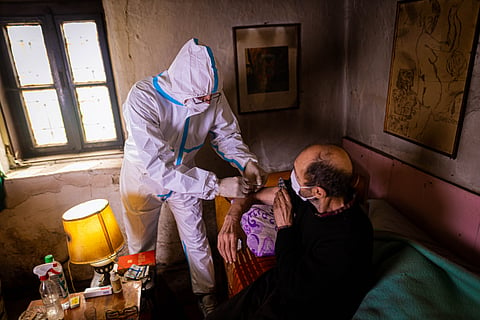

Indian Muslims suffered the largest decline in life expectancy in 2020 during the COVID-19 pandemic compared to 2019. The sobering revelation of the pandemic’s disproportionate impact on social communities in the country was published in a new study, which suggests economic status and marginalisation may have likely driven this loss.
The loss in life expectancy among Muslims was 5.4 years compared to 1.3 years for high-caste Hindus, the study published in journal Science Advances estimated.
This decline is similar or greater in absolute magnitude to that experienced by Black people, Hispanics and Native Americans in the United States during the pandemic.
“Existing studies on pandemic mortality have not been able to look at how the impact of the pandemic varied by age, sex or social group,” Aashish Gupta, Marie Sklodowska-Curie Fellow at the University of Oxford, United Kingdom, told Down To Earth.
The paper analysed data on mortality and socioeconomic characteristics among 765,180 individuals included in India’s fifth Demographic and Health Survey (DHS).
The life expectancy among Muslims in 2020 was 63.4 years, down from 68.8 years in 2019. This amounts to a loss of 5.4 years.
Women in the demographic were particularly hard hit. Women's life expectancy dropped by 6.6 years in 2020 compared to 2019. The data showed that it was reduced by 4.5 years for men in 2020 compared to 2019.
In comparison, the life expectancy of women and men among high-caste Hindus fell by 1.9 and 0.9 years, respectively, between 2019 and 2020.
Muslims were already at a disadvantage before the COVID-19 pandemic began. A previous study that examined data from the Government of India’s Annual Health Survey for 2010-2011 discovered that Muslim life expectancy at birth is roughly a year lower than that of Other Backward Castes (OBC) and high-caste Hindus.
This, however, was not always the case. In 1997-2000, Muslims had a slightly lower life expectancy than high castes, with a difference of 2.1 years for women and 0.3 years for men.
However, this gap has grown significantly over the last two decades. Muslim female and male life expectancy was reduced by 2.8 years and 2.6 years than their high caste counterparts between 2013-2016, read a 2020 study in Population and Development Review.
The reasons for the decline among Muslims are not clear and require further research, the researchers wrote in the new study. But some clues have emerged.
The first probable contributor could be economic status, which is related to health. Muslims are poorer than privileged groups. Over one-third of the population lives below the poverty line, compared to one-fourth among Hindus, according to the researchers.
“It is also likely that marginalised groups [like Muslims] were more severely impacted in terms of income in 2020. However, it is easy to remember that the reason why marginalised groups are poorer has to do with their marginalisation in Indian society. So accounting for income is, in fact, accounting for one of the ways some groups get marginalised,” Gupta explained.
This decline in 2020 is consistent with the further marginalisation of Muslims, with a greater increase in neonatal mortality among this group, the study highlighted.